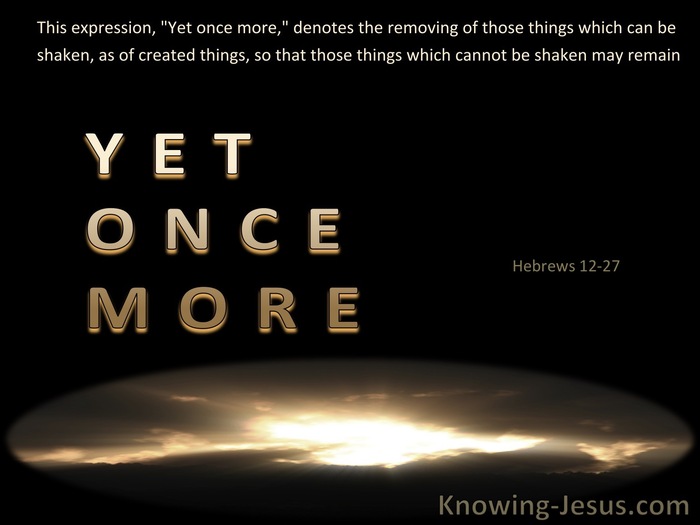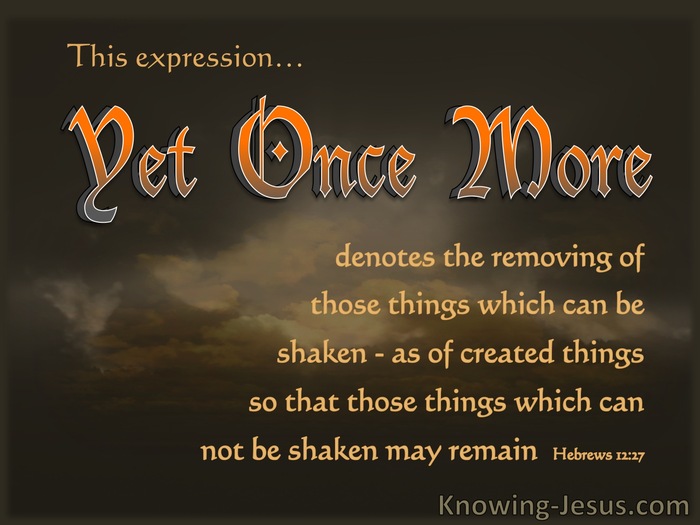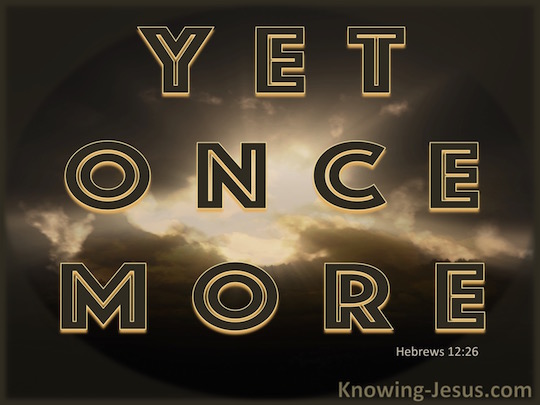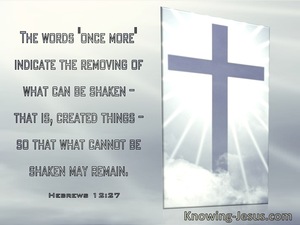Parallel Verses
Youngs Literal Translation
and this -- 'Yet once' -- doth make evident the removal of the things shaken, as of things having been made, that the things not shaken may remain;
New American Standard Bible
This expression, “Yet once more,” denotes
King James Version
And this word, Yet once more, signifieth the removing of those things that are shaken, as of things that are made, that those things which cannot be shaken may remain.
Holman Bible
This expression, “Yet once more,” indicates the removal of what can be shaken
International Standard Version
The expression "once more" signifies the removal of what can be shaken, that is, what he has made, so that what cannot be shaken may remain.
A Conservative Version
And the, Yet once, signifies the removal of the things being shaken--as of things that were made--so that the things not being shaken may remain.
American Standard Version
And this word , Yet once more, signifieth the removing of those things that are shaken, as of things that have been made, that those things which are not shaken may remain.
Amplified
Now this [expression], “Yet once more,” indicates the removal and final transformation of all those things which can be shaken—that is, of that which has been created—so that those things which cannot be shaken may remain.
An Understandable Version
Now the words, "once more" indicate the removing of what can be shaken --- that is, the created universe --- so that those things which cannot be shaken will remain. [Note: These "things" have been variously interpreted to be eternal truth, the heavenly kingdom, the new heavens and earth, etc.].
Anderson New Testament
And this prophecy, Yet once more, signifies the removing of the things that are shaken, as of things that have been made, that the things which can not be shaken may remain.
Bible in Basic English
And the words, Still one more, make it clear that there will be a taking away of those things which are shaking, as of things which are made, so that there may be only those things of which no shaking is possible.
Common New Testament
This phrase, "Yet once more," indicates the removing of those things which can be shaken, as of created things, in order that what cannot be shaken may remain.
Daniel Mace New Testament
and this expression, yet once more" signifies the abolition of those changeable things which were only contriv'd, that what is unalterable might lastingly succeed.
Darby Translation
But this Yet once, signifies the removing of what is shaken, as being made, that what is not shaken may remain.
Godbey New Testament
But he would yet once show the removal of the things shaken, as having been created, in order that the things unshaken may remain.
Goodspeed New Testament
Now the words "But once more" indicate the final removal of all that is shaken, as only created, leaving only what is unshaken to be permanent.
John Wesley New Testament
And this word, Yet once more, sheweth the removal of the things which are shaken, as being made, that the things which are not shaken may remain.
Julia Smith Translation
And the Yet once more, makes manifest the transferring the things shaken, as of things made, that the things not being shaken might remain.
King James 2000
And this word, Yet once more, signifies the removing of those things that are shaken, as of things that are made, that those things which cannot be shaken may remain.
Lexham Expanded Bible
Now the [phrase] "yet once [more]" indicates the removal of what is shaken, namely, things that have been created, in order that the things that are not shaken may remain.
Modern King James verseion
And this word, "Yet once more," signifies the removing of those things that are shaken, as of things that have been made, so that the things which cannot be shaken may remain.
Modern Spelling Tyndale-Coverdale
No doubt the same that he sayeth, "yet once more," signifieth the removing away of those things which are shaken, as of things which have ended their course: that the things which are not shaken may remain.
Moffatt New Testament
That phrase, once again, denotes the removal of what is shaken (as no more than created), to leave only what stands unshaken.
Montgomery New Testament
That phrase, "Once again," signifies the removal of the things which can be shaken, created things, in order that the things which cannot be shaken may remain.
NET Bible
Now this phrase "once more" indicates the removal of what is shaken, that is, of created things, so that what is unshaken may remain.
New Heart English Bible
This phrase, "Yet once more," signifies the removing of those things that are shaken, as of things that have been made, that those things which are not shaken may remain.
Noyes New Testament
And this expression, "Yet once more," signifieth the removing of those things that are shaken, as of things that have been made, in order that those things which are not shaken may abide.
Sawyer New Testament
And this, Hereafter once for all, signifies the removal of the things shaken as of things made, that those not shaken may continue.
The Emphasized Bible
But, the saying, Yet once for all, maketh clear the removal of the things which can be shaken, as of things done with, - that they may remain, which cannot be shaken.
Thomas Haweis New Testament
Now this word yet once more manifests the removal of the things shaken, as of things formed, that the things not shaken may endure.
Twentieth Century New Testament
And those words 'still once more' indicate the passing away of all that is shaken--that is, of all created things--in order that only what is unshaken may remain.
Webster
And this word, Yet once more, signifieth the removing of those things that are shaken, as of things that are made, that those things which cannot be shaken may remain.
Weymouth New Testament
Here the words "Yet again, once for all" denote the removal of the things which can be shaken--created things--in order that the things which cannot be shaken may remain.
Williams New Testament
but now His promise is, "Once more I will make not only the earth but heaven itself tremble." Now that expression, "Once more," signifies the final removal of the things that can be shaken, to let remain the things that cannot be shaken.
World English Bible
This phrase, "Yet once more," signifies the removing of those things that are shaken, as of things that have been made, that those things which are not shaken may remain.
Worrell New Testament
But the expression, "Yet once more," signifies the removal of the things shaken, as of things that have been made, that the things that are not shaken may remain.
Worsley New Testament
Now this expression "yet once more" signifieth the removing of the things that are shaken, as of things which had been appointed only for a season, that those which cannot be shaken may remain.
Themes
Ceremonialism » Laws of, abolished
new Dispensation » General references to
the Enduring » Those things that abide » The spiritual kingdom
Heaven/the heavens » The heavens being shaken
Law » Bondage of » Ceremonial abolished in Christ
New » Creature dispensation » Superiority of the new dispensation over the old))
Superiority of the new dispensation » General references to
The bible » The law part of » Ceremonial abolished in Christ
Topics
Interlinear
De
Saleuo
Poieo
Saleuo
me
Devotionals
Devotionals about Hebrews 12:27
Devotionals containing Hebrews 12:27
References
Hastings
Word Count of 37 Translations in Hebrews 12:27
Prayers for Hebrews 12:27
Verse Info
Context Readings
A Kingdom That Cannot Be Shaken
26 whose voice the earth shook then, and now hath he promised, saying, 'Yet once -- I shake not only the earth, but also the heaven;' 27 and this -- 'Yet once' -- doth make evident the removal of the things shaken, as of things having been made, that the things not shaken may remain; 28 wherefore, a kingdom that cannot be shaken receiving, may we have grace, through which we may serve God well-pleasingly, with reverence and religious fear;
Names
Cross References
Psalm 102:26-27
They -- They perish, and Thou remainest, And all of them as a garment become old, As clothing Thou changest them, And they are changed.
Ezekiel 21:27
An overturn, overturn, overturn, I make it, Also this hath not been till the coming of Him, Whose is the judgment, and I have given it.
Matthew 24:35
The heaven and the earth shall pass away, but my words shall not pass away.
1 Corinthians 7:31
and those using this world, as not using it up; for passing away is the fashion of this world.
2 Peter 3:10-11
and it will come -- the day of the Lord -- as a thief in the night, in which the heavens with a rushing noise will pass away, and the elements with burning heat be dissolved, and earth and the works in it shall be burnt up.
Revelation 11:15
And the seventh messenger did sound, and there came great voices in the heaven, saying, 'The kingdoms of the world did become those of our Lord and of His Christ, and he shall reign to the ages of the ages!'
Revelation 21:1
And I saw a new heaven and a new earth, for the first heaven and the first earth did pass away, and the sea is not any more;








